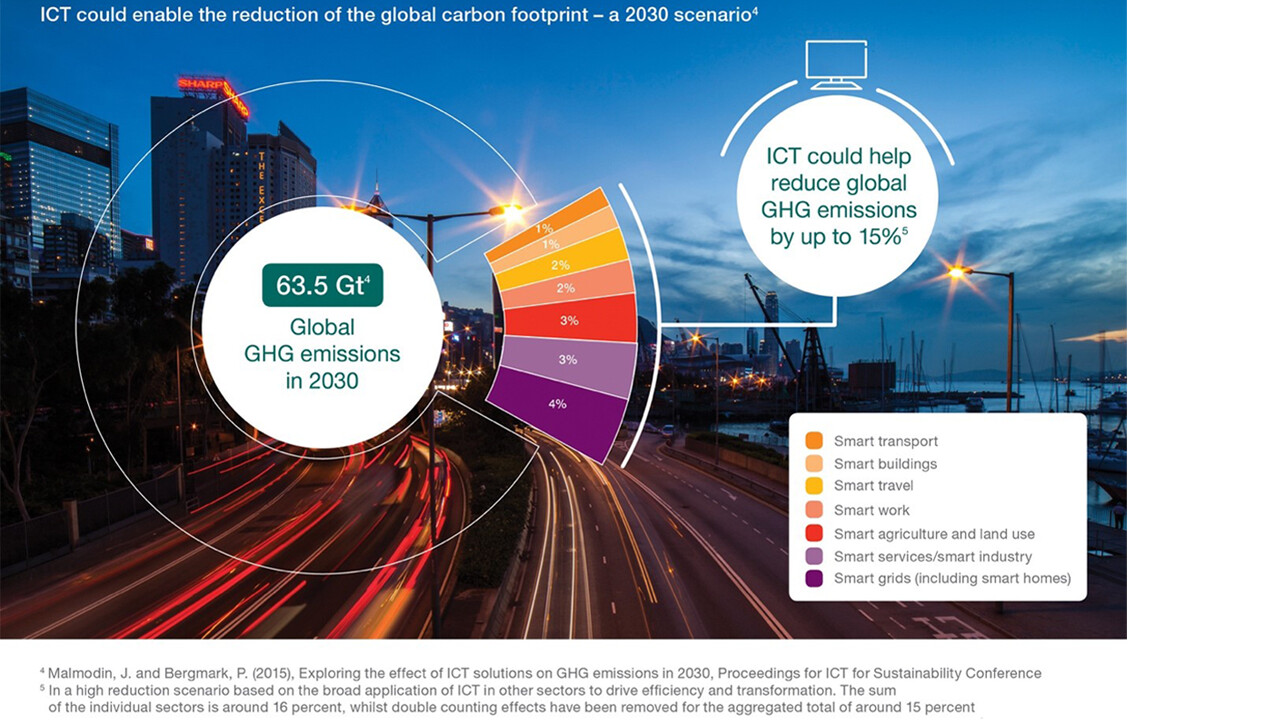How ICT can enable exponential climate action
Tackling climate change is one of the greatest challenges facing humanity. And over the next decade, the technologies of the Fourth Industrial Revolution – particularly 5G, the Internet of Things (IoT) and artificial intelligence (AI) – will provide us essential tools for increasing efficiency in the economy and preparing for a post-fossil fuel society.
The key questions are: Can we do it? And if so, how?
Last year the Intergovernmental Panel on Climate Change delivered its special report on the impacts of global warming of 1.5°C and above. The report clearly lays out the difference between 1.5°C and 2°C warming and emphasizes the urgent need to avoid crossing tipping points in the Earth´s life support systems.
To give us a chance to limit global warming to this level, global greenhouse gas emissions need to peak by 2020 and then fall by half every decade, corresponding to seven percent annual reductions as a global average. We must take unprecedented action to achieve this at all levels of society, including nations, cities, industries and individuals.
The Exponential Roadmap
Last year, we joined forces with organizations such as Future Earth, the Finnish future fund Sitra, WWF, Stockholm Resilience Center, Mission 2020 and several others to explore if halving global CO2e emissions by 2030 is possible, and if so, what would be the possible role of ICT.
The resulting report – the Exponential Climate Action Roadmap – was first launched at the Global Climate Action Summit in 2018 and explores how a 50 percent reduction of greenhouse gas emissions by 2030 can be implemented across key sectors of the global economy, specifically energy supply, industry, buildings, transports, food consumption, and agriculture and forestry. We conclude that the halving of emissions by 2030 is indeed achievable and that the digital technology sector is critical to achieving the goal both through its capacity to directly reduce emissions and as an advocate for climate action.
In order to keep up with current developments and trends and to further strengthen the analysis, the roadmap partners have now published an updated version of the roadmap, the Exponential Roadmap 1.5, together with a high-level report “Meeting the 1.5°C Climate Ambition” that addresses decision makers. Clearly, the content and messages are as valid as ever.
Of the solutions identified in the roadmap, one-third are enabled by existing ICT solutions. These solutions correspond to 15 percent of global emissions, which is more than the footprint of the EU and the US combined. This can be compared to the ICT industry’s own footprint, which has stayed flat for several years at a level of 1.4 percent of overall global emissions in spite of exponential data growth.

Click here to view the enlarged image
Policy suggestions to achieve decarbonization
In contrast to more tech-centric reports, the Exponential Roadmap embeds technology in a much wider societal framework. We believe that technology, when applied in climate solutions, has the power to transform society. But achieving decarbonization at sufficient speed and scale – while limiting negative societal side effects – will require new policy frameworks, financing models, business models, coherent demand and supply side transformation and climate leadership at all levels.
An important part of the Exponential Climate Action Roadmap is therefore its policy study, which include both general and sector-specific items. The most important ones from a broadband perspective include:
- It’s time to shift from visions to concrete roadmaps and strategies at all levels. This means implementing coherent policy packages that support technologies and business models for deep decarbonisation, while suppressing emissions and carbon-intensive processes
- Digitalization and climate strategies must become one and the same thing, with extensive mutual reinforcement
- Circular economy, digital economy and sharing economy models should be optimized and incentivized for climate
- Exponential climate action roadmaps for industries, businesses, cities, regions and nations should be developed
How can we replace high-emission activities?
As companies, we can lead by example by setting sharp climate targets grounded in science and cut the emissions of our own operations and products, as well as working with our supply chains and investing in renewable energy supply. The ICT industry is already the world´s largest purchaser of renewable electricity, making it an important demand-side player.
But while society´s focus is still to a large extent on suppressing activities with high emissions, we must keep raising our ambition to develop solutions to replace them. These solutions often bring huge societal benefits in terms sustainable development as well as business opportunities.

As a company, we have cut our own emissions by 50 percent and are working to meet further reduction targets, as well as demonstrating how our products and solutions can help make halving global emissions achievable.
Now we urge other companies and policymakers to join the quest. The time to act is now. In just over a decade, we must cut the world’s carbon emissions by half, and our industry needs to show the way.
Read more
Please explore the Exponential Roadmap to take a deeper dive, particularly the chapter on Exponential Technology and Solutions. Read the press release here.
Or you can listen to a webinar on the roadmap, featuring Johan Rockström, Director at Potsdam Institute for Climate Impact Research (PIK) and co-chair Future Earth, among many other influential participants.
This article was originally published on the World Economic Forum.
RELATED CONTENT
Like what you’re reading? Please sign up for email updates on your favorite topics.
Subscribe nowAt the Ericsson Blog, we provide insight to make complex ideas on technology, innovation and business simple.